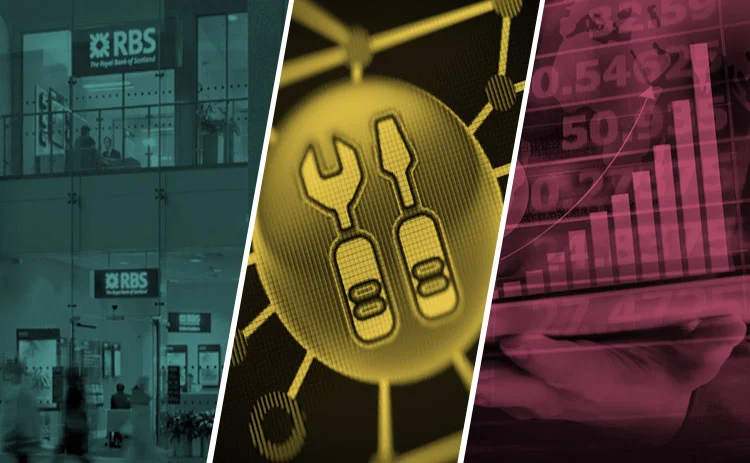
RBS, dividend curves and system failures
The week on Risk.net, March 28–April 3, 2020

RBS exits listed derivatives trading and clearing
Clients served eviction notices last week as bank moves to downsize NatWest Markets unit
Sluggish back-office systems added to margin pressures
Systems supplied by FIS struggled to handle massive spike in March trading volumes
Hedge funds see big gains on dividend curve trades
A popular relative value strategy delivered unexpected profits when companies axed payouts
COMMENTARY: The limits of imagination
Back in 2007, Goldman Sachs’s hapless CFO David Viniar received a good deal of unwelcome attention for describing the credit crunch as a “25-sigma event” – a statement he later amplified by saying that “we were seeing things that were 25-standard deviation events, several days in a row”. A 25-sigma day should, in theory, come along once per universe. Now, just over a decade later, the far reaches of the risk tail are being explored again, with MSCI warning that returns on leverage in its global model are down by 14 standard deviations. It seems that in finance, as on Terry Pratchett’s Discworld, million-to-one chances turn up roughly nine times out of ten.
It isn’t just risk and return models that are being stretched. Eric Yuan, the chief executive of the teleconferencing company Zoom, who must be experiencing a unique mix of euphoria and agonising stress right now, posted defensively this week that “our platform was built primarily for enterprise customers – large institutions with full IT support … we did not design the product with the foresight that, in a matter of weeks, every person in the world would suddenly be working, studying, and socialising from home”.
IT systems for the trading world are also struggling: sluggish back-office systems from specialist provider FIS slowed to a crawl as markets seesawed, producing unexpected strain on brokers whose clients didn’t receive margin statements in time.
Quants are already asking what they can learn from the Covid crisis, as Alex Lipton and Marcos López de Prado described in a new manifesto on Risk.net this week. Their colleagues need to ask the same – credit models under strain are being supplemented with increased scenario analysis, as Risk.net reported last week, but this will be pointless unless risk managers exert themselves to ensure the scenarios go far outside the comfort zone.
All too often scenarios are constructed backwards – not picking a likely severe scenario and asking “could we survive”, but asking “what could we survive” and using that as the extreme. The last few decades have shown that system-threatening crises, at a national or global scale, can be expected roughly once a decade – 1987, 1997, 2008 and 2020.
There’s no longer an excuse for planning any part of the fragile financial system without taking this into account. Companies worried about the expense of crisis-proofing should consider that their investment will inevitably end up looking laudably farsighted – and they won’t have to wait more than a decade or so for it to pay off.
STAT OF THE WEEK
The top US banks have yet to cancel dividend payouts. If they do, they could hold on to around $27 billion of earnings to shore up their capital positions – a dividend freeze for the whole of 2020 could release an amount equivalent to about 3% of aggregate Common Equity Tier 1 capital held as of end-2019. US banks stand apart as top lenders cancel dividends
QUOTE OF THE WEEK
“Almost all accounting rules are procyclical because the world is cyclical and accounts should reflect reality” – Jesper Berg, Danish Financial Supervisory Authority
Further reading
Only users who have a paid subscription or are part of a corporate subscription are able to print or copy content.
To access these options, along with all other subscription benefits, please contact info@risk.net or view our subscription options here: http://subscriptions.risk.net/subscribe
You are currently unable to print this content. Please contact info@risk.net to find out more.
You are currently unable to copy this content. Please contact info@risk.net to find out more.
Copyright Infopro Digital Limited. All rights reserved.
You may share this content using our article tools. Printing this content is for the sole use of the Authorised User (named subscriber), as outlined in our terms and conditions - https://www.infopro-insight.com/terms-conditions/insight-subscriptions/
If you would like to purchase additional rights please email info@risk.net
Copyright Infopro Digital Limited. All rights reserved.
You may share this content using our article tools. Copying this content is for the sole use of the Authorised User (named subscriber), as outlined in our terms and conditions - https://www.infopro-insight.com/terms-conditions/insight-subscriptions/
If you would like to purchase additional rights please email info@risk.net
More on 7 days in 60 seconds
Bank capital, margining and the return of FX
The week on Risk.net, December 12–18
Hedge fund losses, CLS and a capital floor
The week on Risk.net, December 5–11
Capital buffers, contingent hedges and USD Libor
The week on Risk.net, November 28–December 4
SA-CCR, SOFR lending and model approval
The week on Risk.net, November 21-27, 2020
Fallbacks, Libor and the cultural risks of lockdown
The week on Risk.net, November 14-20, 2020
Climate risk, fixing Libor and tough times for US G-Sibs
The week on Risk.net, November 7-13, 2020
FVA pain, ethical hedging and a degraded copy of Trace
The week on Risk.net, October 31–November 6, 2020
Basis traders, prime brokers and election risk
The week on Risk.net, October 24-30, 2020







